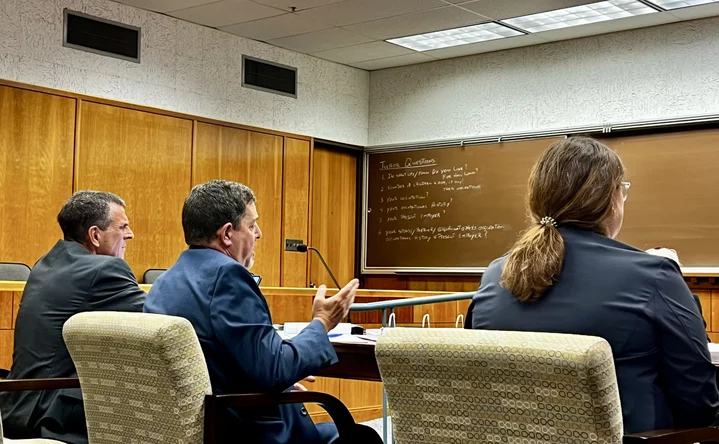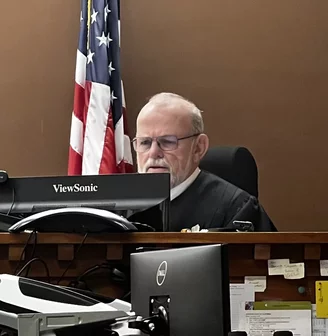Defense attorneys (from left) Barry Landsberg and Harvey Rochman, representing St. Joseph Health Northern California, and (at right) Deputy Attorney General Martine D’Agostino. Not pictured: Deputy AG David Houska. | Photos by Ryan Hutson.
###
Here’s one key takeaway from today’s hearing in the case of The People of the State of California v. St. Joseph Health Northern California, LLC: This is going to take awhile.
In fact, toward the end of today’s hearing, the parties discussed setting a trial start date for more than a year from now — in early September 2026 — but one of the defendant’s attorneys said it’s still premature to take that step.
Perhaps such lengthy proceedings are to be expected in a case that pits the First Amendment rights of a Catholic-run health care organization against California’s Emergency Services Law (ESL) when it comes to abortion care.
The AG’s case argues that Providence Health & Services (the Catholic not-for-profit that owns and operates Eureka’s St. Joseph Hospital) violated multiple California laws through its refusal to provide emergency abortion care to people experiencing obstetric emergencies. The lawsuit focuses in part on the case of Eureka chiropractor Anna Nusslock, who was allegedly denied a medically necessary abortion at St. Joseph Hospital despite an immediate threat to her life and health, and despite the fact her pregnancy was no longer viable.
The specific result of today’s hearing is this: Attorney General Rob Bonta’s office must now seek a preliminary injunction at an evidentiary hearing, where both sides will be allowed to present arguments. The injunction, if granted, would force St. Joseph Health to comply with the ESL. The AG’s Office says such a legal order is necessary to ensure that patients in Humboldt County have access to life-saving health services including emergency abortion care.
The AG’s Office began pursuing such an injunction shortly after it first filed this lawsuit 11 months ago. But last October, the two parties voluntarily entered into a stipulated agreement through which Providence St. Joseph promised to follow the ESL as the case proceeds. Once that agreement was signed, the AG’s Office dropped its pursuit of a preliminary injunction, reasoning that Providence had agreed to comply with the terms it was pursuing.
But then, after consulting with Bishop Robert F. Vasa of the Catholic Diocese of Santa Rosa, Providence seemingly had a change of heart — or a change in legal position, at least. In June it filed a motion seeking to modify or set aside the stipulation on the grounds that it violates the tenets of the organization’s faith, specifically the Ethical and Religious Directives for Catholic Health Care Services (ERD), a set of rules governing health care practices within Catholic health care institutions.
Bonta characterized this move as an effort to back out of a binding contract, saying publicly that Providence was “attempting to find wiggle room to shirk its duty to patients under the law.”
Today’s hearing before Humboldt County Superior Court Judge Timothy Canning concerned two opposing motions: the State’s motion to enforce the stipulation and Providence/St. Joseph Health’s motion to modify it or “set it aside.”
Canning wound up granting neither motion. Instead, he ordered St. Joseph Health to abide by the terms of the stipulation while the State proceeds with its attempt to secure a preliminary injunction. A case management hearing was scheduled for Oct. 27 at 8:30 a.m.
In the meantime, today’s hearing provided a glimpse into the major legal and ethical arguments in play in this court battle.
Deputy Attorney General Martine D’Agostino opened by saying, “The issue before the court today is straightforward: enforcement of an unambiguous contract.”
She argued that St. Joseph Health was asking the court to endorse “a novel rule of contract interpretation [whereby] a party can back out of an unambiguous contract at any time, simply by arguing that it violates their religious principles.”
At one point, Judge Canning asked D’Agostino whether, in the State’s view, the stipulation has a set timeline or expiration date. She replied, “No, Your Honor. The stipulation has no time limit.”
“So, is it the Attorney General’s position that this would apply even after the trial?” Canning asked.
“Yes, that’s our position,” D’Agostino replied.
She was joined at the prosecution table by Deputy Attorney General David Houska, who said the State’s case is not based on the fact that St. Joseph Health is a Catholic organization but rather on the basis that the hospital was denying abortion care when it is legally required to provide it.
He referenced a letter submitted to the court by Bishop Vasa saying that, in his view as a Catholic faith leder, abortion is only permissible when — and here Houska quoted from the letter — “‘The only alternative is the certain death of both the mother and the child.’”
Houska argued that this position conflicts with the ESL.
“Prohibiting intervention until death was certain would be waiting until a patient is in septic shock, cardiac arrest or otherwise in extremis,” he said. Many such patients would die, he continued, adding, “Those who survive would likely be left with lifelong, serious ailments. This is neither the standard of care nor the law.”
D’Agostino then said the State’s purpose in court today was to ensure that the women of Humboldt County don’t needlessly face potentially irreparable harm by being forced to wait “until they are sufficiently near death for St. Joseph to finally render life-saving aid. The law forbids it,” she said. “And, Your Honor, a deal’s a deal. Do not let St. Joseph betray the trust of the women of Humboldt County again.”
Providence St. Joseph was represented in court today by attorneys Harvey Rochman and Barry Landsberg, with the former handling today’s oral arguments. He assured the Court that his client will abide by the stipulation as the case proceeds but said there really should be a full evidentiary hearing before the court grants a preliminary injunction.
Rochman went on to argue that there are larger issues at stake.
“[W]e are faced with motions by the Attorney General which seek to have this court order the hospital to perform abortions that … are contrary to the Catholic rules,” he said. “That is, of course, a major issue. … It’s a freedom of religion issue.”
Rochman cited a 2016 agreement between Providence and then-Attorney General Kamala Harris, saying the state agreed at the time to allow the organization to apply the Ethical and Religious Directives on a case-by-case basis, with Providence hospital policies ultimately determined by “multi-disciplinary local ministry ethics teams.”
Ethical decisions that cocnern when it’s acceptable to terminate a pregnancy can’t be left up to the discretion of individual doctors, Rochman argued.
“The stipulation is in direct conflict with that [position],” he said. “It would put the decision in the hands of the physicians.”
Rochman said Providence St. Joseph deserves the right to present evidence before the court issues a preliminary injunction, and he tipped his hand to show what type of evidence the defense will provide. He cited a sworn declaration from Nusslock’s treating physician at St. Joseph Hospital, who determined that she was stable when she was discharged. If that’s true, it would negate any allegations that the hospital violated the ESL in Nusslock’s case, Rochman said.
Judge Canning asked why such arguments weren’t incorporated into the stipulation. Why didn’t Providence St. Joseph seek to make the agreement temporary pending a hearing on the merits of a preliminary injunction, as the attorneys are belatedly trying to do now?
Rochman said he wasn’t representing Providence when that agreement was struck, and he allowed that the stipulation could have been written better. But he quickly returned to the Constitutional matter of Freedom of Religion.
“People don’t necessarily understand the relationship between the hospital and the Catholic Church,” he said. Part of the reason St. Joseph Hospital is here is because it has been sponsored for more than 100 years by a congregation of nuns who came to the area on “a health care healing mission of Jesus.”
That mission is what keeps the hospital operating programs even when they’re losing money, Rochman said.
”And frankly,” he continued, “the whole concept of St Joseph — a Catholic hospital — having to somehow pick up the slack for Mad River [Community Hospital] because they decided to save money and close their labor and delivery service doesn’t actually make sense … .”
He was interrupted, here, by a chorus of groans from the mostly full courtroom gallery. Judge Canning warned that if there were any more such outbursts, he’d clear the courtroom.
When Rochman returned to the matter of the 2016 agreement between the State and Providence, Canning interjected to ask whether whether this deal, as described by Rochman, doesn’t violate the First Amendment’s Establishment Clause, which prevents the government from endorsing or favoring any particular religion. If the state gave its blessing for Providence to defer to the Catholic Ethics and Religious Directives, isn’t that an example of the State endorsing religious doctrines? the judge asked.
Rochman said that argument was new to him, but he’d be happy to consider it and respond in a court brief.
In closing, he reiterated his point that the terms of the stipulation “would have a massive impact on the hospital’s free exercise of religion,” and he again requested a full hearing on the preliminary injunction.
Given an opportunity to rebut the defense’s arguments, Houska circled back to the matter of who should be responsible for making medical decisions. He said the state’s bar on the corporate practice of medicine exists specifically to make sure that such decisions are left up to doctors, not corporate boards or religious ethics committees.
”Determining when a patient is sick enough to warrant specific treatment is an absolutely quintessential medical decision that only doctors in their professional judgment ought to be making,” he said.
These arguments and more are likely to be resurrected during the hearing on a preliminary injunction, whenever it occurs. Again, the next hearing in this matter is a case management conference scheduled for Oct. 27.
###
CORRECTION: This story initially misspelled attorney Harvey Rochman’s name. The Outpost regrets the error.
###
PREVIOUSLY
- Attorney General Sues St. Joseph Hospital for Denying a Woman Emergency Abortion Care
- Providence Offers ‘Profound Apologies’ to Woman Denied Emergency Abortion Care at St. Joseph Hospital
- A Local Doctor Urged St. Joseph Hospital to Change Its Anti-Abortion Policies Long Before State Lawsuit, According to Court Declaration
- BREAKING: St. Joseph Hospital Denies Allegations in State Abortion Care Lawsuit But Agrees to Follow State Health Care Laws as the Case Proceeds
- Judge Signs Order Committing St. Joseph Hospital to Providing Emergency Abortions, At Least For the Duration of AG Lawsuit
- Citing Religious Freedom and Catholic Doctrine, St. Joseph Health Challenges State’s Emergency Abortion Care Lawsuit on a Variety of Legal Grounds
- State Responds to St. Joseph Health’s Attempt to Get Emergency Abortion Lawsuit Dismissed
- ‘Providence Must Follow the Law’: At the Humboldt Reproductive Health Care Rally Before the Latest California vs. St. Joseph Hospital Hearing
- St. Joe’s Abortion Care Lawsuit: In a Packed Courtroom, Hospital’s Attorneys Ask Judge to Dismiss the Case
- New Abortion Care Lawsuit Filed Against St. Joseph Hospital by the National Women’s Law Center
- PBS NewsHour Reports From Eureka on the Limits of Reproductive Health Care at Catholic-Run Hospitals
- Judge Denies St. Joseph Health’s Motion to Dismiss State Lawsuit Over Emergency Abortion Care
- CalMatters: Her Miscarriage Showed the Limits of California’s Abortion Protections. Where You Live Matters
- Attorney General Says Providence is Trying to ‘Shirk Its Duty’ to Follow the Law In Emergency Abortion Care Suit
- Providence’s Effort to Back Out of Emergency Abortion Care Agreement Would Put Humboldt Women ‘Back in Harms’ Way,’ AG’s Office Argues in Latest Court Filing


CLICK TO MANAGE